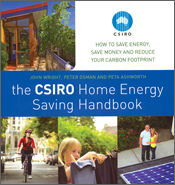 I was interviewed on Monday by a researcher from the University of Wollongong about my experiences with installing solar hot water at our old house. They’re looking into why people choose solar, how they choose the system and supplier, what their experience has been, etc.
I was interviewed on Monday by a researcher from the University of Wollongong about my experiences with installing solar hot water at our old house. They’re looking into why people choose solar, how they choose the system and supplier, what their experience has been, etc.
Sitting in on the interview was an interesting guy from CSIRO named Peter.
We got chatting about hot water and home energy usage, and I mentioned something from the book I’m reading at the moment – The CSIRO Home Energy Saving Handbook. “Oh,” said Peter, “that’s my book.”
Turns out he’s Peter Osman, one of the authors! How often is it you’re chatting to someone and they turn out to be the author of the book you’re currently reading?!
We had a great talk, and Peter was very interested in the playing around I’d done with the solar hot water system. Things like turning off the electric boost through summer and setting the thermostat on the system lower. I’d been keeping almost-daily electricity meter readings as well, and he’s keen to get that data.
One of the things Peter is looking at is how to make solar hot water systems more efficient with a “smart” off-peak boost controller. A big problem with the current setup is that many households use most of their hot water in the afternoon/evening, then the off-peak electric boost heats the water in the tank overnight, so by the time the sun comes up the next day the water is hot and there’s very little work for the sun to do other than merely maintain the temperature. A smart booster could use things like weather forecasts, hot water usage patterns, time of year, etc to decide when and how much to heat the water using electricity, so that the maximum benefit possible is gained from the sun and electricity use is minimised.
We also talked about general home energy savings, and he really liked the concept of the chest fridge I built. It’s still working wonderfully, by the way.
You can read more about Peter’s research into climate change, energy use and sustainability at his web site, EnergyClimate.com.
And definitely check out the CSIRO Home Energy Saving Handbook – it’s available from Kiama Library, among other places. Don’t forget to visit the Handbook web site to get copies of the worksheets, too.
A really good idea for controlling the solar hot water electric/gas boost is to simply use a timed switch. By default it is off, thus the hot water is not boosted when it gets below a certain temperature. However when required, the homeowner simply pushes in the timed switch and the water is heated for a short period of time, after that the switch automatically turns off and its solar only heating again. The switch is best installed where it is easily accessible (say the kitchen).
A friend of mine (an electrician) uses this set up and it works brilliantly. It is a simple and cheap way around the problem of inappropriate boosting.
The other thing that can be done to extend the solar hot water heating benefit is to have the temperature of the water in the tank at a higher temperature. Thus the water lasts long during overcast periods. Done correctly with normal household water usage and an appropriately sized tank, the hot water should last for a few days with no solar contribution during that period.
Again, this is a simple adjustment which does not require any fancy electronics.
@Jason: Very good advice. Our system was off-peak. A timed switch would have been good, but if you forget one night then you have cold water and an angry wife until the next off-peak electricity period :-).
If you have good solar exposure, a properly sized system, and generally decent weather (like here in the Illawarra), then it may actually make more sense to switch away from off-peak and use normal electricity for manual boosting only when required. Some people I know have this kind of setup, and really don’t need to boost very often.
Good point about using normal tariff electric power. That is what he does. With off-peak power and manual boosting, then you are likely to run out of hot water.
I use normal tariff electric hot water at the moment, and it is still fairly cheap. So it is certainly an affordable option for manually boosting solar hot water systems.
Nice one. This is our blog about ours. We use off peak for boost. For the last 3 days we’ve used 6kW.
http://abundense.blogspot.com/2010/08/everything-you-ever-wanted-to-know.html
Hey thanks for the useful links you provided! I’m gonna be needing this handbook for my sister’s school stuffs. Great post by the way 🙂